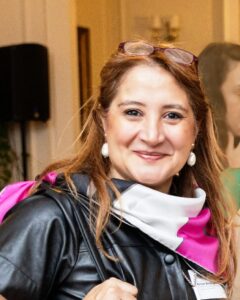 This is the fourteenth in the series of short statements from candidates in the coming CODATA Elections at the General Assembly to be held on 17-18 October 2025. Burçak Basbug is a candidate for the CODATA Executive Committee as an Ordinary Member. She was nominated by the Middle East Technical University.
This is the fourteenth in the series of short statements from candidates in the coming CODATA Elections at the General Assembly to be held on 17-18 October 2025. Burçak Basbug is a candidate for the CODATA Executive Committee as an Ordinary Member. She was nominated by the Middle East Technical University.
It is an honour and privilege to be nominated to be part of the CODATA Team, who are dedicated to connect people and science to address global challenges!
‘Knowledge grows, when it is shared!’
I am very passionate and enthusiastic as a scientist, as a woman, as a mother to provide a safer world to people in need. I strongly believe we, if we unite, can reduce the impacts of any disaster in anywhere in the World. We can create safer communities, safer nations, safer Globe for the humanity. It is our responsibility to leave a better World to our children, grandchildren, grand grandchildren… and for all of us!
On my current role, I work a Professor of Statistics and Disaster Science, at the Middle East Technical University (METU), Ankara-Türkiye. I graduated from METU Department of Statistics in June 1999. My appointment to academia as a research and teaching assistant is 16 August 1999, which is the day before the devastating 17 August 1999 Marmara earthquake. So, it was meant for me to work in disaster statistics. Since then, I have been working hard to understand disaster related data, use it to generate strong policies so that we can reduce disaster risks.
In 2000, I moved to the UK to persuade my graduate studies at the University of Warwick (MSc.in Statistics-2001) and London School of Economics and Political Science (Ph.D. in Statistics-2007). I worked under the supervision of the late Emeritus Professor Henry. P. Wynn, who was the president of the Royal Statistical Society UK (https://rss.org.uk/news-publication/news-publications/2024/general-news/henry-philip-wynn,-1945%E2%80%932024/ ). I learnt a lot from him in the World of Statistics.
I have been teaching, researching and developing for 26 years at international level as well as national level on disaster risk reduction, earthquake insurance, applied statistics, linear models, statistical design of experiments, survey and sampling methods, disaster risk governance. I had opportunity to merge theoretical knowledge with field experience in the following events:
- Covid-19 response in the UK and in Türkiye
- 13 May 2014 Soma Mine Disaster
- 23 October 2011 Van Earthquake in Türkiye
- 2009 Urban Disaster Risk Reduction Training in Japan at Kobe City, Hyogo Prefecture in Japan, then follow-up visits in 2011 and 2015.
- Syrian Refugee Response Evaluation of UNICEF 2015
- August 2020 Giresun Flood in the Black Sea Coast of Türkiye
- 30 October 2020 Earthquake in Izmir as a result of the Sisam Fault Rupture
- 6 February 2023 Kahramanmaras Earthquakes
I was the project coordinator of the Turkish Disaster Data Bank (TABB in Turkish acronym) between 2012 and 2014. I worked as the Course Director of MSc Disaster Management and Resilience at Coventry University-UK between 2019 and 2020. Prior to this, I was the Director of the METU Disaster Management Centre between 2008 and 2018. I am a full member of the Chatham House-UK. I serve as an editorial board member of the ODI journal ‘Disasters’.
I am a co-chair of the CODATA International Data Policy Committee (IDPC) since 2022 as well as the UNESCO-CODATA Data Policy for Times of Crisis Facilitated by Open Science (DPTC) Toolkit Project.
I believe in multidisciplinary, multi-hazard approach where theory and practice meet to create disaster resilient individuals, communities, nations and globe. I have experience working with the high-level policy makers at the institutions such as the World Bank, UNESCO, UNICEF, Japan International Cooperation Agency (JICA), Disaster and Emergency Management Authority (AFAD) and more.
In years, a lot of people asked me “What is a statistician’s role in disasters?” so many times. I used to respond them ‘You need to make the data talk, explain, tell you some scientific baseline so that you can generate policies to help people live in safer and better conditions, with reduced risks!’
If elected, I will work very hard to contribute the CODATA Team to achieve CODATA’s vision with my networks, experience, willingness to learn and share, research and data skills, energy, dedication, loyalty and passion! Thank you so much!
